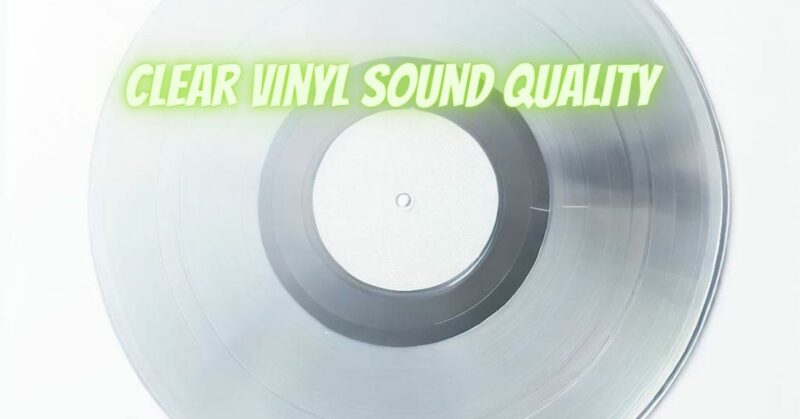Clear vinyl records, known for their unique and transparent appearance, have become a captivating choice for vinyl enthusiasts and collectors. However, a common question that arises is whether the transparency of clear vinyl has any impact on sound quality. In this article, we will explore the science of clear vinyl production and determine whether it affects the sonic performance of vinyl records.
The Vinyl Manufacturing Process:
To understand the potential impact of transparency on sound quality, it’s essential to grasp the vinyl manufacturing process. Vinyl records are primarily composed of PVC (polyvinyl chloride) pellets, which are a clear and colorless material. When producing clear vinyl, no additional pigments or dyes are added to the PVC pellets. This results in a transparent record that retains the inherent characteristics of the vinyl material.
Factors That Influence Sound Quality:
Sound quality in vinyl records is influenced by several factors, and the transparency of the vinyl itself is not among the most critical determinants. The primary factors that influence sound quality include:
- Pressing Quality: The manufacturing process and quality control measures employed during pressing play a pivotal role in sound quality. A well-pressed vinyl record, whether clear or black, can provide excellent audio fidelity.
- Mastering: The mastering process, where the master lacquer is created from which records are pressed, significantly influences sound quality. The expertise of the mastering engineer and the care taken during mastering are paramount.
- Playback Equipment: The quality of your turntable, tonearm, cartridge, and speakers greatly affects the sound you hear. A high-quality playback system can reveal the full potential of any vinyl record, regardless of its color or transparency.
- Record Condition: The condition of the vinyl record, including cleanliness and the absence of scratches or wear, is essential for preserving sound quality.
Clear Vinyl Sound Quality:
Clear vinyl records, when well-manufactured and well-pressed, are capable of offering sound quality equivalent to that of standard black vinyl records. The transparency of the material itself does not inherently impact sound quality. Instead, the sonic performance of clear vinyl records is primarily determined by the factors mentioned above.
Collectibility and Aesthetics:
Clear vinyl records are often produced as limited editions or special variants, making them highly collectible among vinyl enthusiasts. Collectors appreciate the unique aesthetic appeal and transparency of clear vinyl, which can add to their allure as collectible items.
In summary, the transparency of clear vinyl records does not inherently impact sound quality. Sound quality is primarily influenced by factors such as pressing quality, mastering, playback equipment, and the condition of the record itself.
Clear vinyl records can offer the same high-quality audio experience as their black counterparts when produced and handled correctly. Audiophiles and collectors can enjoy clear vinyl records for their unique aesthetics, collectibility, and visual appeal without concerns about compromised sound quality. The choice between clear and black vinyl ultimately comes down to personal preference, visual aesthetics, and the desire for a distinctive addition to one’s vinyl collection. The essence of vinyl records lies in their analog sound and the immersive experience they provide, regardless of their transparency.


